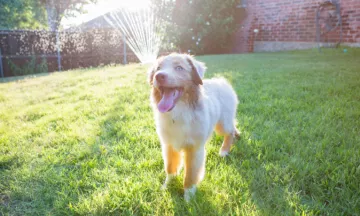German Shepherd: Breed Spotlight

Fact sheet
- Breed name: German Shepherd / Alsatian
- Classification: herding dog
- Size: medium - large
- Coat: long to medium
- Colour: tan with black
- Personality: intelligent, loyal, energetic
- Family-friendly: yes, for experienced dog owners and active families with older children
- Friendly with other pets: yes, for well-trained dogs
German Shepherd Background
Loyal and smart, German Shepherds are famous for their service in police and military units around the world.
German Shepherds (or 'Deutsche Schäferhunds') originated in Germany at the turn of the 20th Century. Many kennel clubs renamed the breed the 'Alsatian Wolf Dog' after WWI because of anti-German feelings at the time. However, the most widely used name around the world is now 'German Shepherd'.
German Shepherds originally guarded and herded sheep flocks in harsh, cold weather. As such, the desire to work and serve still runs strong in the breed. Consequently, these dogs are iconic for their duties in service, security and search and rescue operations.
Physical Appearance of the German Shepherd
German Shepherds are medium to large dogs with long muzzles and pointed ears. They have a muscular build, long limbs and bushy tail. Their course coat comes in two varieties. The ‘Normal Coated’ variety is medium length, and the ‘Long Coated’ variety has soft, long patches around the chest and ears.
These powerful dogs can stand between 56cm - 64cm tall and weigh around 40kg. As such, they need to be well trained and supervised when around small people.
German Shepherd Behaviour and Temperament
German Shepherds can be a little shy with strangers on first meeting. However, once they get to know you they can be sweet and goofy. They are as loyal as can be to their family, and their protective nature makes them a great guard dog.
Female German Shepherds are a little more patient with rough play than males. As such, you might consider a female if you have small kids. Regardless, these dogs need proper socialisation and training from a young age. Doing so will make your German Shepherd a lot more easy-going when meeting new people and dogs.
These dogs need to use their brains to be happy - whether in learning, playing or performing tasks. As such, this isn’t the right breed for you if you aren’t home much. Leaving a German Shepherd home alone for long periods of time will lead to problem behaviours, such as chewing and barking.

Training and Exercising German Shepherds
Owning a German Shepherd means ongoing training and socialising. These are dogs with energy to burn and a sharp mind and will need playtime every day. As such, experienced dog owners and active families are best suited to this breed. Notably, training does pay off, as these clever dogs can easily learn commands and tricks.
It’s important to be patient, calm and firm when training your German Shepherd. Puppy preschool is a great place to teach your dog good manners and habits. Starting early and being consistent will set your pup up for life.
An adult German Shepherd will need daily walks and playtime. However, puppies should take it a little slower and need to be eased into more energetic activities. Train your dog on soft surfaces such as grass, at least until their joints have fully grown.
Living with a German Shepherd
German Shepherds need a good walk every day and an enclosed backyard to run and sniff. They should never be tethered or tied up in a yard, and are happiest when they have company during the day. If not, they can experience separation anxiety.
It’s a good idea to raise your German Shepherd from puppyhood with your kids and other pets to keep everyone safe and sound. However, it’s still important to supervise these dogs and never leave them alone with small people and pets. Proper socialisation will prevent aggression and calm your dog’s tendency to over-guard.
Poorly bred German Shepherds can be nervous and harder to train. Therefore, be sure to get to know your dog before you adopt it or do plenty of research on your dog’s breeder first.
German Shepherd Health
German Shepherds are robust dogs but can encounter some breeding-related illnesses. Therefore, speak with your breeder to make sure you’re minimising the risk of these problems. They usually live to the age of 10 - 12.
The following health issues can come up in German Shepherds:
- Hip and Elbow Dysplasia
- Skin diseases and allergies
- Degenerative Myelopathy
- Gastric Dilatation-Volvulus (also known as ‘bloat’)
- Perianal Fistula
- Degenerative Myelopathy
- Hemangiosarcoma

Grooming
German Shepherds shed a lot, so prevent your floors from getting too fluffy by brushing daily. As such, buy a good brush and a strong vacuum! Their thick coats have natural oils to keep them clean and shiny. Therefore, it’s easy to over-bathe them and we suggest doing this only when they’re super muddy or smelly.
Your dog's claws may need a monthly trim at the local vet or dog groomer to keep them from getting too sharp. And keep your dog's teeth shiny with dental chews and a doggy toothbrush and toothpaste.
Lastly, clean their ears gently with a gently doggy ear-cleaner and cloth once a week to prevent infection.
Are you going away soon and need someone to keep your German Shepherd company? It’s time to book a Pawshake sitter! Just enter your town or suburb and find a great pet sitter now.






